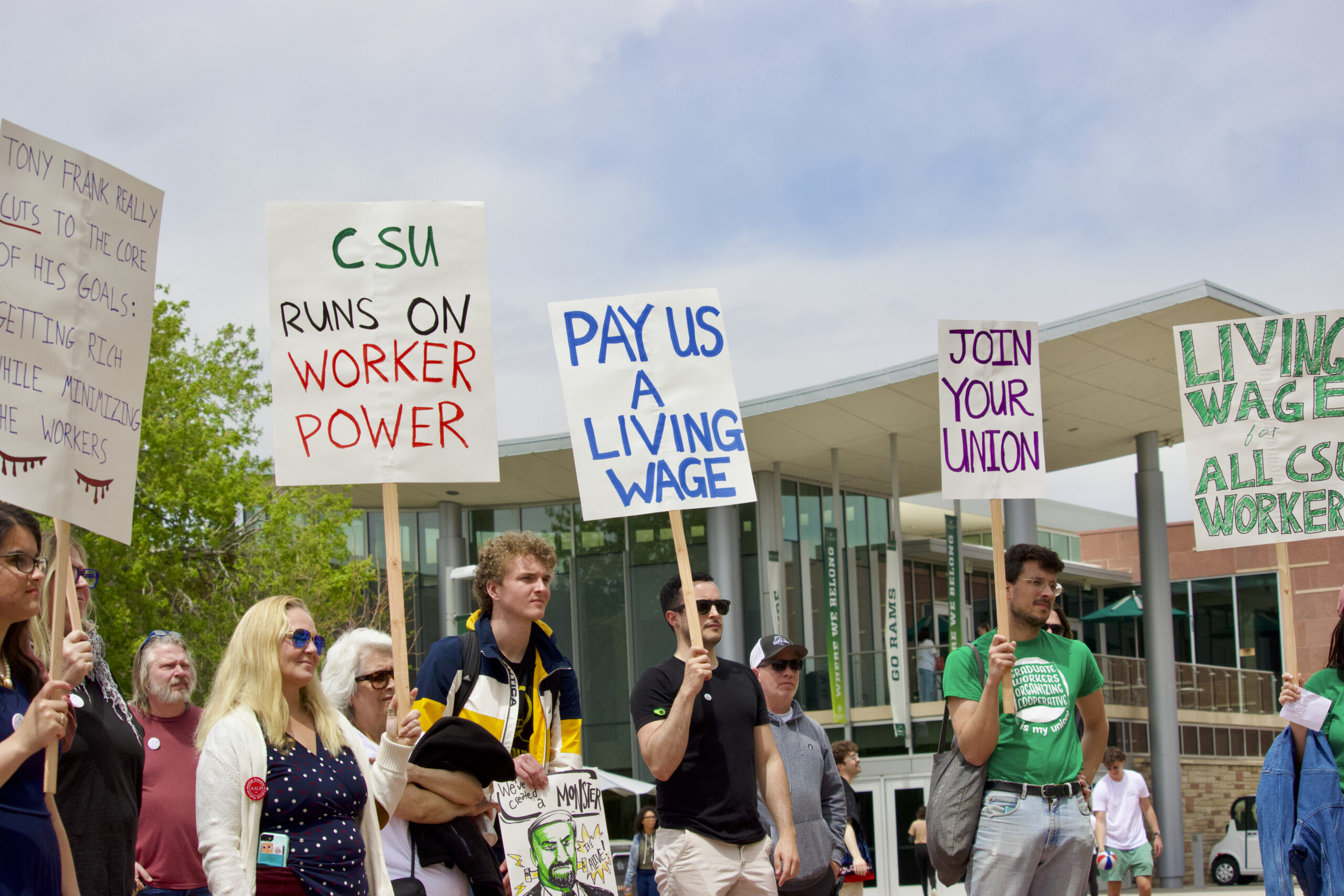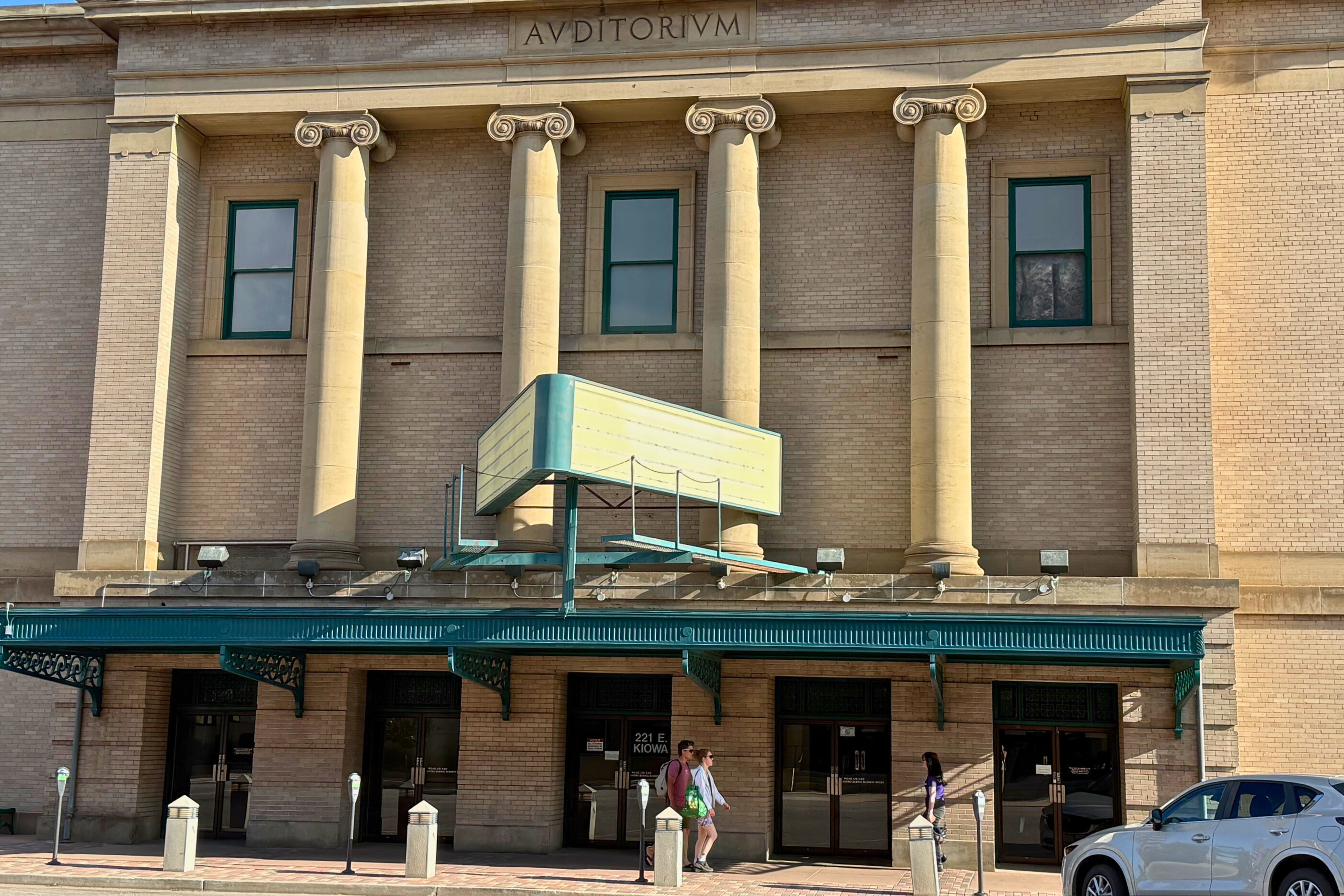
"What do you want? Fair pay! When do you want it? Yesterday!"
That was the cry of more than 100 faculty, staff and graduate student workers at a Thursday, May 4, rally on the campus of Colorado State University in Fort Collins. The chant came as university administrators pitched their plan to the board of governors to increase compensation and hike tuition next year. The board will vote on the $1.5 billion budget at a meeting next month.
“This is a budget that prioritizes compensation,” said Amy Parsons, president of Colorado State University at last week’s two-day meeting.
She said the $27 million invested into compensation was the single largest item in the budget. The budget also includes equity adjustments above 5 percent to raise the floor of the lowest-paid administrative staff and faculty to $50,000.
But demonstrators say the proposed 5 percent increase in compensation for administrative staff and faculty (a 3 percent hike for graduate workers) isn’t nearly enough to keep up with the rising cost of living in Fort Collins.
“And that is on top of salaries that for many employees were already inadequate,” Mary Van Buren, president of the CSU chapter of the American Association of University Professors, told the board during public comment.
Faculty and other campus workers argue that low pay is forcing some graduate students to choose between eating and paying rent and is wearing out overstressed staff. Full-time tenure-track faculty can be paid as little as $64,000 a year. Non-tenure track faculty, who regularly teach four courses a semester, can be paid as little as $48,000 a year. Administrative assistants, dining hall workers and custodians earn salaries in the low $30,000s, they said.
Van Buren says the budget shouldn’t fall on the backs of students, workers or instructors, “but should creatively address the inadequacy and stark lack of equity in salaries that has been perpetuated by following the same process year after year and which has resulted in the current situation.”
What are faculty and staff asking for?
Faculty are asking for a minimum base salary of $70,000, so they could afford to live in Colorado, and an 8 percent pay raise to cover the cost of living. They’d also like to move away from the merit-based pay system.
“It actually is a way for us to turn against each other,” said John Pippen, an assistant professor of music. Instead, faculty would like an across-the-board raise with set dollar amounts, which would give a faculty member making $50,000 the same raise as a dean earning more than $200,000.
But there are many other staff members aside from faculty who are underpaid, Pippen said. He pointed to “academic success coordinators,” those who help undergraduates navigate their degrees. He said though they have one of the most important jobs on campus, with a wage starting at $50,000, there’s high turnover.
“The people who do stick it out are really tired and are really overworked, and they're not able to honor their commitments to our students,” he said.
University response
Chancellor Tony Frank said at Thursday’s meeting that everyone agrees that compensation should be higher and tuition lower. How to get there is more complicated.
He said if there were no tuition increase, “the simple fact is even if we redline everything else on this budget, there aren't enough new resources to cover the 5 percent compensation increase.”
If the university gave an 8 percent raise to cover a cost of living increase, it would be short about $20 million, he said. Funding it would take either a bigger tuition increase or asking departments to cut $20 million without knowing the impacts.
“That's a substantially risky, I would argue, challenge to take on,” Frank said.
He also addressed what he called the “common budget boogeymen.” For example, people ask why donor money can’t fund a salary hike. Frank said donor funds are almost always restricted and the half a billion in research funding the university garners is also restricted. What about athletics? Frank said if the university eliminated athletics, it would be a one-time 2 percent salary increase.
“And you lose all the things if you believe there are positive things associated with athletics.”
He acknowledged the frustration among many staff and that people are hurting. He said the CSU budgets each campus has proposed aren’t perfect.
“But do they represent an attempt to balance legitimate competing interests of the university? I think that's a question for you all to ask yourselves. I believe they do. I think they look hard at trying to hold tuition down. I think they look hard at trying to bring compensation up.”
In addition, administrators noted that some colleges and divisions have reallocated funds toward employee compensation over and above any across-the-board raise. That amounted to reallocations this fiscal year of $4.5 million and $2.5 million in the previous fiscal year.
“It is something this campus is taking seriously and looking for opportunities and savings to reinvest into our own staff,” said Brendan Hanlon, vice president for operations and chief financial officer for the Fort Collins campus.
Graduate student workers will get a 3 percent increase
Graduate students did win a victory in 2022 when the university agreed to gradually eliminate their mandatory fees. But Andrew Feder, a graduate research assistant in atmospheric sciences, said the proposed 3 percent stipend increase doesn’t help much when the base graduate worker salary is $16,128.
He said on-campus housing costs have gone up, and some graduate students are forced to live illegally, violating the city’s “U plus 2” law forbidding more than three unrelated people from living in the same place. Student health insurance doesn’t cover dependents or spouses. Parking costs are high.
“We're just kind of getting squeezed,” Feder said. “It's becoming increasingly impossible to live on a graduate stipend.”
Danielle Demateis, a third-year Ph.D. student in statistics, told the board her savings are depleted.
“I am now realizing that choosing to come to CSU for my Ph.D. was not a smart financial decision,” she said.
International graduate students are particularly strapped because they are entirely dependent on their stipend. The terms of their visa don’t allow them to take other employment.
Graduate research assistant Bee Leung said the university is driving away talented, hard-working graduate students.
“I personally know many grad students who have had to take on second jobs, who have had to dip into their savings, take out loans, or even sell their blood plasma just to make it in between paychecks,” she told the board.
The low salaries are impacting classified staff, too. Classified worker Stephen Maddock told the board that two months ago one of the dining halls lost eight staff. Residential plumbing staff decreased by half as some left for better-paying jobs at other institutions. The residential electrical team went from eight to two people, Maddock said.
“This is unsustainable,” he said. “We are unable to attract the talent we need at CSU to provide the quality we need to support our students.”
After public comments, board chair Kim Jordan thanked the speakers and said she hears their frustrations.
“I can tell you that it’s something we are discussing regularly,” she said.
Rob Long, the student representative who sits on the board, said the impending tuition increase is worrying many students. He read out loud several students' testimonies about the hardships they face because of high tuition.
“We serve as the bedrock of this institution,” Long said. “It’s all of our failures if one student is not allowed to be here because of this increase.”
Faculty and students argue it’s not just a wage issue. It’s impacting students.
They say it’s a bigger systemic issue in how funds are allocated – and it’s impacting academics. Pippen said the school of music can’t offer scholarship money that is competitive enough for students to support themselves.
“What they end up doing is taking on jobs in order to support themselves to pay their very high rent and their very high tuition, and then they don't do as well in their degree programs, which is the whole reason they're here.”
Graduate economics student Deb Nunes said the classes she taught used to be capped at 40 students a section. This year she has one with 60 students.
“One of the proxies for student success is the well-being of their instructors," she said.









